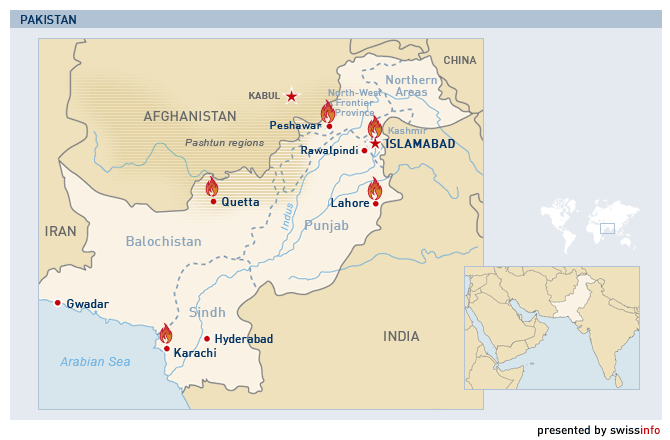
Swiss react cautiously to events in Pakistan

After imposing a state of emergency in Pakistan on Saturday, President General Pervez Musharraf continues to repress opposition and media.
Switzerland reacted like many other countries with concern, but the Swiss government has yet to call off the export of arms to Pakistan.
Musharraf, who took power in a 1999 coup, has ousted independent-minded judges, put a stranglehold on the media and granted sweeping powers to authorities to crush dissent.
Thousands of people have been rounded up and thrown in jail since Saturday, including members of former Prime Minister Benazir Bhutto’s party.
Gilbert Etienne, an honorary professor the Geneva Institute of Graduate International Studies, says Musharraf is trying to nip in the bud any form of resistance.
“In March Musharraf removed the president of the Supreme Court, a decision invalidated by the Supreme Court and followed by large demonstrations by lawyers and by the establishment. That forced the president to reverse his decision,” he said.
“With these massive arrests, Musharraf is probably looking to avoid a repetition of that. It should be pointed out that Pakistani civil society is active and well able to mobilise itself.”
Musharraf’s sole concession to protests, both within Pakistan and abroad, is to promise to hold the elections “as soon as possible”, with one foreseen date being January.
“Unconstitutional”
Most foreign media, including that in Switzerland, agree on the reasons that forced Musharraf to declare a state of emergency.
Musharraf’s decision to scrap the country’s constitution on Saturday came ahead of a Supreme Court ruling on the legality of his recent re-election as president. Critics said he should have been disqualified because he contested the vote as army chief. The top judge, Chaudhry, and other justices were removed and replaced.
Under the emergency, Musharraf purged the Supreme Court of independent-minded judges. So far, eight judges have taken a new oath. Previously there were 17 judges in the court. In their first ruling, the eight “set aside” a ruling of seven other rebellious judges, including Chaudhry, who had rejected the emergency as unconstitutional.
The court is expected to resume hearings on Musharraf’s eligibility for another presidential term and issue a quick ruling in his favour.
Military supplies
For all that, the reasons of security used by the Pakistani government for the state of emergency cannot be dismissed out of hand.
“There has been an escalation in the attacks by Jihadist movements,” said Etienne, adding that “Pakistan remains a tense country”.
“This tension can be seen in the war in the Taliban zones near the Afghan border, in the often bloody struggle between Shiites and Sunnis, and between the Punjab and the other provinces or the secessionist movements from Balochistan.”
It is for this reason that the Swiss government was invited by Green parliamentarian Josef Lang to halt its export of military supplies to Pakistan, as the Zurich Tages-Anzeiger newspaper revealed on Tuesday.
In December the Swiss government authorised the Swiss firm Oerlikon Contraves to sell to the Pakistani army anti-aircraft defence missiles worth SFr136 million ($120 million). The delivery of this materiel has yet to be completed.
Jean-Philippe Jeannerat, spokesman for the Swiss foreign ministry, told Swiss radio that the Swiss government had not changed the green light regarding the sale to red, but it was monitoring the situation and could change its decision accordingly.
For her part, Swiss President Micheline Calmy-Rey, who wrapped up a trip to neighbouring India on Wednesday, told reporters that Switzerland had for the time being suspended its field visits to development programmes because of security risks.
“The government will discuss weapon exports next week and we are monitoring the situation daily,” she told a media conference.
swissinfo, Frédéric Burnand in Geneva
Switzerland has recognised the independence of Pakistan since its creation in 1947.
In 1949 the two states established diplomatic relations.
In 1966 they signed an accord of technical cooperation, completed in 1975 by an accord in the event of catastrophe.
After Pakistan was chosen as a priority country for Swiss development aid, the Swiss Agency for Development and Cooperation opened an office in the Pakistani capital Islamabad in 1977.
During the Bangladesh War of Independence and the Indo-Pakistani War of 1971 Switzerland represented Pakistani interests in India and vice versa.
During the 1970s and 1980s Switzerland concluded several accords with Pakistan concerning the rescheduling of debt.
Pakistan population: 152 million.
Ethnic groups: 50% Punjabi, 15% Sindhi, 15% Pashtun, 8% Muhajir, 5% Baloch.
Religions: 97% Moslem, (90% Sunni, 10% Shi’a), small Christian and Hindu minorities.
Gross domestic product: $118.47 billion (SFr135 billion).
Swiss community: 239 people
Swiss exports: SFr354.9 million
Change over previous year: +4.44%
Swiss imports: SFr42.5 million
Change over previous year: +0.81%


In compliance with the JTI standards
More: SWI swissinfo.ch certified by the Journalism Trust Initiative
































You can find an overview of ongoing debates with our journalists here . Please join us!
If you want to start a conversation about a topic raised in this article or want to report factual errors, email us at english@swissinfo.ch.